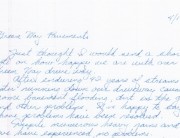Change has to Change
Change is one of the highest ingredients of Life. It’s up there with honesty, trust and detachment. It is the essence of Divinity.
Change for better or for worse are obvious spectrums that define change itself. Change is subject to one’s perception and application. The thief changed his tactics and stole more diamonds. That can be categorized as a positive change, but not for the jewelry storeowner. The thief then stopped smoking, also a positive change. Where’s the jury on this?
Our Earthly duality forces an array of spectrums upon us constantly. Black versus white, dark versus light. What exhausts me is hearing the oldie: “Is the glass half full or half empty. These dualities can get quite ambiguous, especially for children, and stubborn adults. Maybe we can change that!
What about using the term “Improvement”! It absorbs change. Just takes it to a better place. Would mankind be better off using the word “improvement” instead of the word “change”? With that reasoning, keeping a positive attitude enlivens the creative Spirit in us all—even the thief.
The word “Improvement” puts a distinctive momentum onto performance. It virtually captures every aspect of positive change and encapsulates it. The athlete has definitely improved consumes a multitude of changes undertaken by the athlete to excel.
The attitude behind improvement carries more weight and purpose. And with attitude, there is behavior. Focusing more on human behavior will serve us more than the abstract of change. Rocks constantly change, but ever so slow. But seeing an alien in front of you would definitely change your behavior. The notion of improvement finds its roots in emotions, which infers ongoing memory and recall.
The word “Change” connotes a rough and challenging process. “Improvement” actually connotes a celebration, so to speak. Change can be viewed as a step-by-step process, while “improvement” can be taken as streaming. Let’s take a litmus test. Which feels better for you: “I see you changing” or “I see your improvement”?
But the real hang up is the fact people don’t change unless forced into doing so by a life-changing event. In many cases, it takes funerals, accidents, illnesses, divorces and criminal acts to initiate change in a person. In all actuality, people can’t change another, even if warranted. Change comes slowly. When you tell someone to change, then they become more protective and will resist. “Telling” destroys creativity and kindles a quick rebuttal. So avoid “Telling” and begin to realize that any change in a person must come from within themselves. With respect to improvement, the Hebrew writings by Talmud states: “We don’t see things as they are, we see things as we are.” For me, mastering change doesn’t really get you anywhere, but mastering improvement should show you more promise.
There is a great disparity occurring in how our societies change. Since cultures vary from one nation to another, it’s hard to predict how change unfolds in a society outside of your own. Since the great recession of 2009, many nations struggled with economic change, whereas, the United States definitely showed constant improvement. Look at the Arab Spring. It was perceived by many Westerners as change for the better. On the other hand, little improvement was realized. I think Gandhi missed the boat on a social basis when he said, “Be the change you want to see in the world.” However, he hit the nail on the head when he related that phrase on an individual level.
Some literature suggests that God chose Lucifer to be the catalyst for Change. That Divine schema puts a tad of conflict into the picture. A little conflict serves as a great catalyst for change. But Lucifer went too far with that! Change is based on duality. It touches upon cause and effect, and disappears into the quest to learn the unknown or satisfies the thirst for power.
To me, God is Change, which is contrary to Aristotle’s view that Change ends with perfection. Though, I consider God to be the perfection of change. What (or who) do you know that doesn’t change?
The prospect of human evolution carries two stages: from animal to human, and from human to the Divine. The book “Change Your DNA, Change Your Life!” presents a good take on this prospect. In 1995, most scientists and medical researchers held the notion that our DNA did not change. To them, it was a building block structure for our multi-trillion cells. Ten years later, all heck broke lose with the discovery that: “Yes, Indeed. Our DNA constantly and magnificently changes. Our DNA carries a self-healing capacity to move us forward in Life. The gist of this is laid out in the aforementioned book. It’s not so much about change, rather the blessings of improvement.
The next time you get married, or decide to reword your wedding vows, consider not saying “For better or for worse,” rather “for our eternal improvement.”
Have Fun. Peace and Health,
Dr. Robert V. Gerard
www.greenwaypavements.com
© 2015












